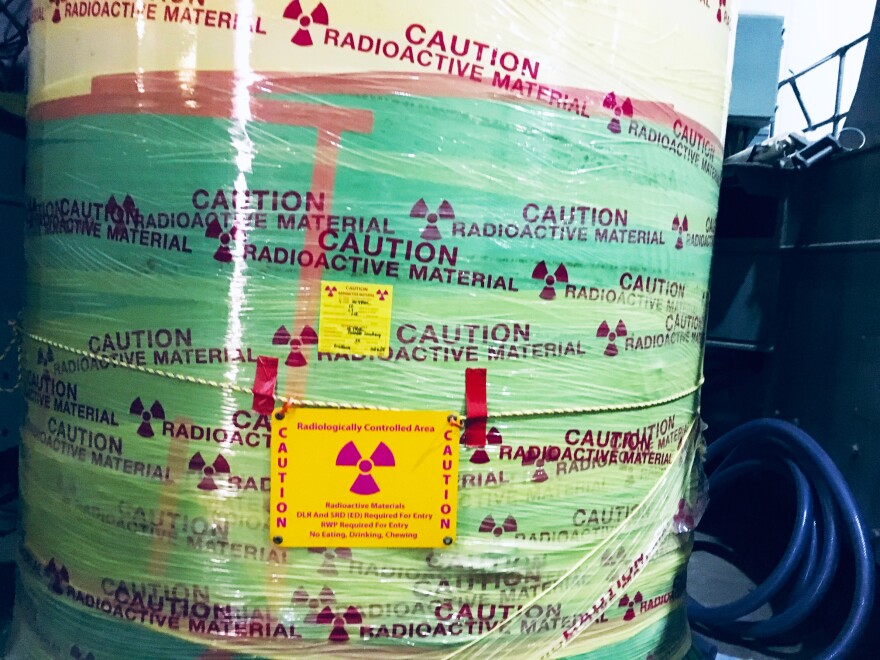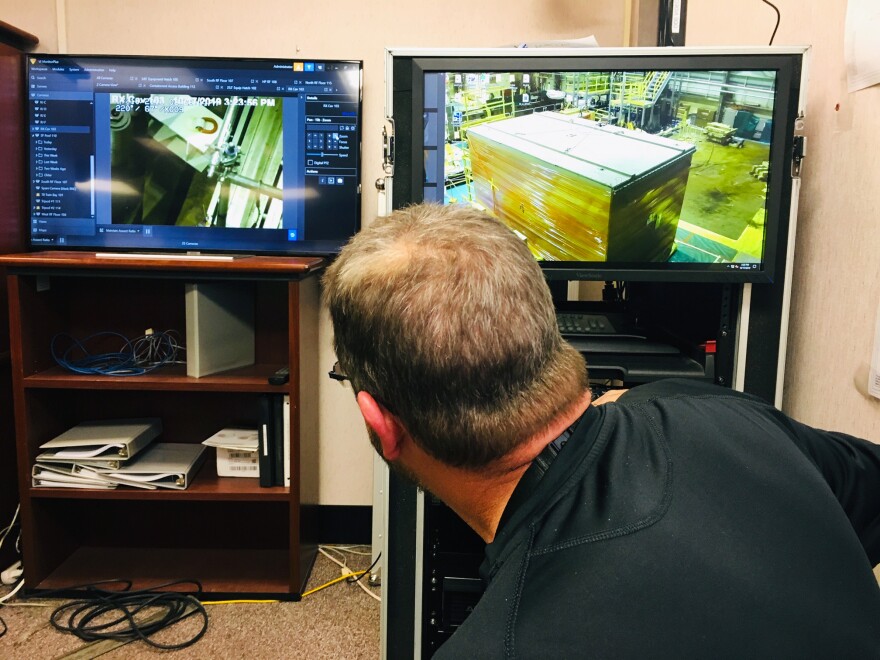The company that's tearing down the Vermont Yankee nuclear power plant hopes to use its experience to bid on similar jobs around the country. To do that, it's got to get the decommissioning process right in Vermont.
Train cars roll slowly into, and out of, the Vermont Yankee property in Vernon. The cars bring in massive machines, specialty tools and rigs that are used to cut up and transport the nuclear reactor, and all the machinery and buildings around it.
And on their way out, the train cars haul away specially-made boxes, packed with low-level radioactive waste.

NorthStar Group Services, the New York-based industrial demolition company that now owns Vermont Yankee, is taking it down piece by piece. It's the first time a third-party company has purchased a reactor outright before decommissioning and removing the plant.
This is according to Julie Lieberman, a senior project manager with the national consulting firm Concentric Energy Advisors, which worked with NorthStar and the Vermont Public Utility Commission on the Vermont Yankee deal.
She said the so-called third-party decommissioning transactions work well for energy utilities, who would otherwise have to rely on contractors to tear down the plants that are closing due to low natural gas prices and the relative higher costs of nuclear power.
“We anticipate the trend toward third-party decommissioning transactions to accelerate as the nuclear industry continues to face a precipitous decline,” she said. In the meantime, Lieberman said industry stakeholders will be watching NorthStar's progress.
“Only time will tell if taking on the risks of buying plants to profitably decommission them will prove to be a good bet," she said.

Scott State is CEO of NorthStar. He's well aware of how much is riding on what happens in Vernon.
“If you don’t get the first one right, you don’t get the next one,” State said. “And it’s important that we demonstrate for the entire industry that these plants can be retired, that, you know, that they are plants that ran a long time, generated a lot of energy, but ultimately they have to be removed.”
All of the spent fuel at Vermont Yankee, the high-level nuclear waste, has already been removed.
For now it's being stored right outside the plant, in sealed casks. Northstar is seeking federal approval to move it to Texas.
While the spent fuel is packed away, everything else that’s left – the metal, the concrete and the machinery that’s been in close contact with the nuclear reactor – is considered low-level radioactive waste.
And that’s what workers are chopping up and packing into canisters and shipping boxes, which are then transported to a waste depository in Texas. On a recent afternoon at Vermont Yankee, a small piece of the reactor lid, which once weighed 60 tons and was almost two-feet thick at its widest point, was packed in a box waiting to be moved out.

About 70 workers are taking apart the power plant. And this is the work State thinks NorthStar can do all over the country, at nuclear reactors that have reached the end of their working life.
But that doesn't seem like such a good idea to a D.C. area nonprofit that advocates for a nuclear-free and carbon-free world. Tim Judson with the Nuclear Information Resource Service says this kind of business model needs a lot more scrutiny.
The Nuclear Regulatory Commission does sign off on the license transfer when a utility turns a plant over to a company like NorthStar. But Judson says once the work begins inside the plant, no one’s really watching to make sure it’s done safely.
“The NRC has a very hands-off approach to decommissioning,” Judson said. “We think that the NRC is essentially abdicating its responsibility by approving these really anomalous and dangerous arrangements.”
At the core of these business deals are the decommissioning trust funds that have built up over years. The NRC requires original plant owners to invest in these accounts, and every nuclear power plant in the country has hundreds of millions of dollars for decommissioning.
Vermont Yankee had about $506 million in its fund when NorthStar took control of the Vernon reactor. And if the company can finish the work on time and under budget, then it stands to cash in on part of what's left.

In the meantime, NorthStar will compete with at least two other companies as it tries to win contracts to decommission other plants. Judson says with so much money at stake, these companies should be held accountable for the work they’re promising to do.
“We think there’s a lot of risk associated with this business,” Judson said. “Potentially with the decommissioning funds going bankrupt, and before sites are fully cleaned up, the potential for communities to be left with reactor sites that are not fully decommissioned.”
NorthStar thinks it can handle up to six of these jobs at a time, moving demolition teams into and out of reactor sites around the country as specific projects are completed.
Apart from its decommissioning work in Vernon, the company is currently tearing down buildings in multiple locations, some in the middle of large cities with people and cars and buses moving underneath.
So working in Vermont, in a vacant power plant in the middle of corn fields, is a lot less stressful according to State, NorthStar's CEO.

“I don’t want to downplay the significance, but day-to-day work for us, this is typically the kinds of things we’re doing at hundreds of sites around the country,” State said. “There’s nothing different about it. We’re not working on sites with radiological contamination every day, but it’s just another one of many hazards we plan for when we do our work.”
The Vermont Department of Public Service plans to post the monthly fund balance of Vermont Yankee's decommissioning trust fund on its website, along with a monthly summary of expenditures.
NorthStar has used about $65.5 million so far, with another $10.5 million to be disbursed in November, and the department’s director for public advocacy, Jim Porter, said the state has retained experts to review the monthly financial withdrawals.
"The department’s experts conclude that amounts disbursed to date are in line with what is expected for this project," he said.
The state health department and agency of natural resources also say NorthStar is meeting its reporting obligations.
NorthStar says the Vermont Yankee decommissioning is three or four years ahead of schedule. The company already has a contract with a second power plant outside of Tampa, Florida.
Never miss a thing! Get all of VPR's Southern Vermont stories delivered to your inbox, for free. Sign up here.





